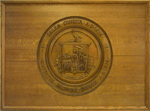Captain Lightfoot
Originally named Michael Martin, he was dubbed "Captain Lightfoot" when he started a life of a highwayman. He traveled for a time with
Captain Thunderbolt around England, Scotland and Ireland. They only robbed from the rich and never incited violence.
He came to Salem from Ireland in 1818.
"Martin, meanwhile, traveled to Boston and from there north to Salem, Mass. He worked for a time for Elias Hasket Derby, Jr., heir to many of Salem’s China Trade millions. But he soon received news from home that
his father died. On the heels of that news came $400 from his brother, representing Martin's inheritance.
Now with nearly $500, Martin took a last stab at going straight. He set himself up as a brewer, but the beer making business proved too difficult for him to master. By 1821 he was broke and in debt.
Martin resumed his robbing as Captain Lightfoot, travelling up to Montreal and back down through Vermont. "
His game was up when he robbed Major Bray of Medford. He was the first man sentenced under the new law that called for the death penalty for highway robbers.
He was hanged at Lechmere Point in 1821 in front of a large crowd. Before going to the gallows, he dictated his life story to a local reporter, Frederick W. Waldo.
The resulting story became a huge sensation after his death. This story inspired two major Hollywood movies, 1955's Captain Lightfoot (starring Rock Hudson) and 1974
Thunderbolt and Lightfoot (starring Clint Eastwood and Jeff Bridges).
See Also
Lightfoot and Thunderbolt - the last New England highwaymen N.E. Historical Society
Thunderbolt and Lightfoot, the highwaymen who raised hell in New England Irish Times
